How to motivate a child who doesn t care
How to Motivate a Child Who Doesn’t Care
If you recently enrolled your son or daughter in an early childhood school, you might have noticed by now that there are instances when they are unmotivated to go to school. Many parents seek our advice on how to motivate a child, especially when it comes to their studies.
Before you can actually succeed in motivating your child, let us first discuss and define motivation.
Understanding MotivationTo be able to understand why a child acts as he/she does and how we can help a child, we need to understand the two kinds of motivation. Motivation has 2 kinds: extrinsic and intrinsic.
Intrinsic MotivationIntrinsic or internal motivation is the driving force that allows you to do things because you want to do them. This type of motivation is very powerful. It is the drive inside of us that pushes us to pursue the things that we love and enjoy doing.
As infants, we have this intrinsic motivation to learn and explore the world. Depending on how parents deal with this intrinsic motivation, a child’s drive to learn and explore can either be suppressed or encouraged.
Extrinsic or external motivations are the things that you want to have or people that you want to be like. External motivation pushes us to do things so that we can achieve or succeed with our goals and aspirations.
External motivation can also be encouragement from important people in one’s life. It can be parents, siblings, friends, and other significant persons. What we see and feel about our surroundings are also powerful forces that a child can take to motivate himself.
Your child needs both of these types in order to succeed at school. As parents, you should first instill in him that going to school is a stepping stone for them to achieve their dreams and aspirations in life. Your encouragement will serve as their extrinsic motivation.
On the other hand, their natural drive to learn and explore will be their intrinsic motivation. Parents also have a big part to play so that your child won’t lose this motivation.
Parents also have a big part to play so that your child won’t lose this motivation.
Help your child to cultivate his intrinsic motivation. You can do this by tuning into his feelings of accomplishment and the pride that he feels after he does a job well done.
How can I motivate my child?Source: flickr.com
Before you succeed in motivating your child, you need to observe the things that he/she enjoys. Naturally, children like to play. However, once they enter the school, they may get culture shock because they are not used to the setup.
Because of the new setup, the child may experience stress. As a result, the child is unmotivated to go to school, because it takes his/her precious playtime.
Motivating children to go to school can be frustrating. However, it is very important that as parents, you must not force your kids to do certain things. Forcing a child to do something that he does not really like may cause depression in the long run.
You may think that if you can always find ways to encourage your child, he/she will automatically be motivated. We believe it is not like that at all.
Related Read: What is Permissive Parenting and How does it affect your child?
What to Remember About How to Motivate a Child
Kids, because they think that their precious playtime is taken away from them, become motivated to resist and to underperform.
You must understand that no matter how unmotivated your child may seem, it is impossible to have no motivation. Every child is motivated, one way or another.
A child who is acting out is motivated to resist and do nothing. Doing nothing is actually an action. It is actually an action to resist you and his teachers. They may even reason out that they don’t need school.
Children are motivated to act like they don’t care whatever you do. They may say things like, “It’s hard”, “I can’t do it”, and most of all, “I don’t care.
To address this problem, you should first understand that you can’t make your child “care”. You can always read articles and blogs online and consult professionals, but it simply won’t solve the problem.
You can always read articles and blogs online and consult professionals, but it simply won’t solve the problem.
This problem is usually experienced by parents of high school students or those kids who are in their teen years. However, this is also a common problem for parents of toddlers.
Some kids are self-motivated, but there are other kids who need a little push here and there. Parenting is a really tricky business, you should get all the tips you could get.
If you notice that your son or daughter always answers to you with “I don’t care,” here are a few parenting tips you can follow.
- Observe your kids.
What is he most interested in? If your child likes dinosaur toys or dolls, you can use that and give them as a reward. Observing what they like and enjoy will give you an idea of what things you can give as rewards.
Observing what your child enjoys lets you know your child more. In the long run, knowing your child gives you a better understanding of how he/she behaves a certain way. This is the golden rule of parenting, take time to know your child.
This is the golden rule of parenting, take time to know your child.
As you learn along with your child, you may use the things that he likes as rewards for doing a job well done.
Source: Wikimedia
Kids are motivated to do things if there are rewards. They must be held accountable for their actions. For example, if he hasn’t finished his homework, he can’t play video games.
By doing their homework and chores, he earned 2 hours of video games. Be firm in this and slowly, you are teaching your kid that he is accountable for his actions.
Little by little, you will be able to see the progress, and that you won’t have to constantly remind him to do his homework, because it has become a habit.
Even if you are a parent, remember that kids need to be respected, too. If your kid is acting out, the best way out is to talk to him calmly.
If you are going to shout as he shouts, you won’t be able to accomplish anything. Remember, children are just starting to learn to manage their emotions and behavior.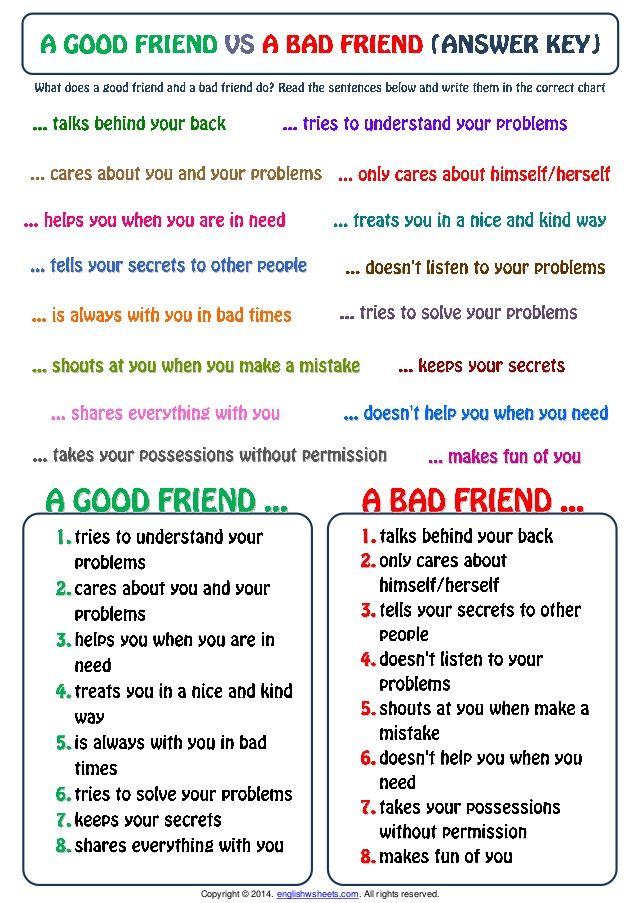 You are the grown-up, so you should be the one to adjust.
You are the grown-up, so you should be the one to adjust.
If your child is too angry, let him be. Anger is just a normal emotion, everyone feels angry sometimes. You can sit down with him until he’s calm, then talk to him.
If a child feels that he is being listened to, he will gradually open up and change his behavior towards you.
Your child’s biggest dreams and aspirations are a good motivation. Talk to your child about what he wants to have someday. Sneak in different ideas on how your child is going to get those dreams.
Once you have had him share about things that he wants to have, you can, later on, say, “That is nice, but you can’t get it if you don’t start working hard as early as now. Attending school is the stepping stone to achieve your dreams.”
For little children, their dreams might be Transformers merch or Lego sets. You can tell him that we won’t buy it if you won’t cooperate with your teacher at school.
By doing this, your child will realize that his actions have consequences. As he realizes that, his behavior will also gradually change for the better.
As he realizes that, his behavior will also gradually change for the better.
Source: flickr.com
Raising your voice shows frustration. It makes your child think that he is in control. As a result, he won’t change his behavior.
With a child who does not care, you, as a parent, should always keep your cool. Arguing with your child won’t give you good results. Instead, sit down with him, make him feel that even if he is being bad, you will stay by his side.
A child who is under a lot of stress tends to irrationally lash out at people, trying to get attention. As a parent, you should be the calm in his chaos. Do not add up to his stress, stay by his side no matter what.
Once he is calm, you can help him do his homework! You can give him tips so he can finish fast.
It is very important that you tell your kids that what their dreams in life matter to you, too. You can personalize it by telling them, “I want to support you in achieving your dreams, it matters to me. That is why I want you to do well.”
That is why I want you to do well.”
This concept helps because as his parent, you are one of his significant others. Relationships are always a good motivation.
This can be the key to building a good relationship. They need to feel that you will always be there to support them.
Do not let your child learn “learned helplessness”. Learning this will make him think that if he can’t do something, somebody else will. This is a destructive approach.
When a kid or a child in his teen years uses this shortcut, they will never learn independence. Let your child solve his problems on his own. Being dependent on other persons will never bring your kid to success.
Start them small. As toddlers, let them have a share of house chores. Let them dress themselves up. These things encourage autonomy and independence.
In fact, research shows that kids who have anxiety and depression are those who were not allowed to be independent very much.
It helps when you introduce your kid to new friends with whom he can play and socialize. Kids tend to imitate what their friends do. You can also arrange a group study where he does his homework with his friend.
Kids tend to imitate what their friends do. You can also arrange a group study where he does his homework with his friend.
Never do your child’s homework, let him do it. You can always help him to discover the correct answers and give advice, but don’t take on his tasks. Do not easily give the answer to a certain question.
Family is there to guide them, not to give everything to them. You can always give tips to help them arrive at the correct answer.
We believe that one of the most important things that a child or an adolescent can learn in his life is independence.
- Be a Coach.
Coaches get the most out of players. It is their job to help their players want to improve their skills.
So, what does a coach do?
He takes time to learn a little bit about his players. A good coach is not always just giving praise, rather, he keeps his players motivated by complimenting them on their specific skills.
This coach parenting style needs to be learned by many parents. You must always keep your child looking forward. Comment on his/her progress instead of just blindly praising them when they haven’t really exerted that much effort.
Believe it or not, kids can see through flattery and false praise like adults do. In the context of teens, false praise can sometimes backfire to worse behavior.
You must give your child an organized schedule of when to do his chores and schoolwork, and give a specific amount of time that he needs to finish. He can use this approach as he goes through high school and college.
It is important to have a schedule and routine even at an early age. Routines help kids develop responsibility and autonomy in their life. It is also helpful in fostering cooperation in families.
Also, schedules help a child to focus on one task at a time. It also gives him room for improvement. It makes sure that all of the efforts he exerted is not put to waste.
Related Read: Symptoms of ADHD in Toddlers: Advice for Parents and Caregivers
We were made to believe that praising children every time they do something nice is good when it is actually unhealthy. Many parenting articles have already discussed it. Humans are supposed to do good, so praising every good deed makes it futile.
Praises are only good when you see how hard your child tried to achieve something. Like when he is able to build a puzzle that he has not built before. Praising the child continuously even after he has done it several times in the past no longer makes sense.
Also, your child might always seek your praise just for doing what he needs to do. When we praise them for their effort and make them see that falling short is an opportunity to improve themselves, they will surely be more motivated to work hard and believe that they can achieve whatever they put their mind to.
Source: Pixabay
Toddlers learn best through play. This fuels their intrinsic motivation to explore and learn. Through play, a child can discover lots of things.
Through play, a child can discover lots of things.
In school, kids are also given playtime. However, most of the time a child is in school, they are expected to be seated and listening to their teacher.
After school, give your child one to two hours of play before doing his school work. Playing calms a child’s mind. Relieve the stress he had from behaving inside a room full of strangers by giving him some free play after school hours.
Children who have enough playtime with their families are believed to be more independent, healthy, and happy.
Related Read: When Do Toddlers Learn Colors? Here’s What You Should Know
As parents, we know that you could not help but expect your child to always excel in school. However, your expectation of your child is one common cause of depression and anxiety among teens.
Teens often feel the need to always please their parents because they want them to be proud. You may say that it can motivate your child, but sometimes, it does the opposite. Worse, teens experience a lot of stress and go into depression.
Worse, teens experience a lot of stress and go into depression.
You should learn to control your expectations of your kids. Giving them your all-out support whatever endeavor they go into will be very helpful for their success in the future.
Kids with supportive parents have a better sense of self and can confidently speak to other people.
Your choice of teacher is also a big part in motivating your child. Before you actually enroll in a school, make an effort to get to know the teachers first.
You can always ask for recommendations from friends and family before you entrust your child to school. You can also check the school’s reviews online.
Source: flickr.com
The teacher will be the one to directly communicate with your child, and you wouldn’t want a teacher who doesn’t show an ounce of care and love for kids.
The teacher will also be the one to teach your son about the basic knowledge that every person must have. So, make sure that the teacher has patience and knows how to handle kids well.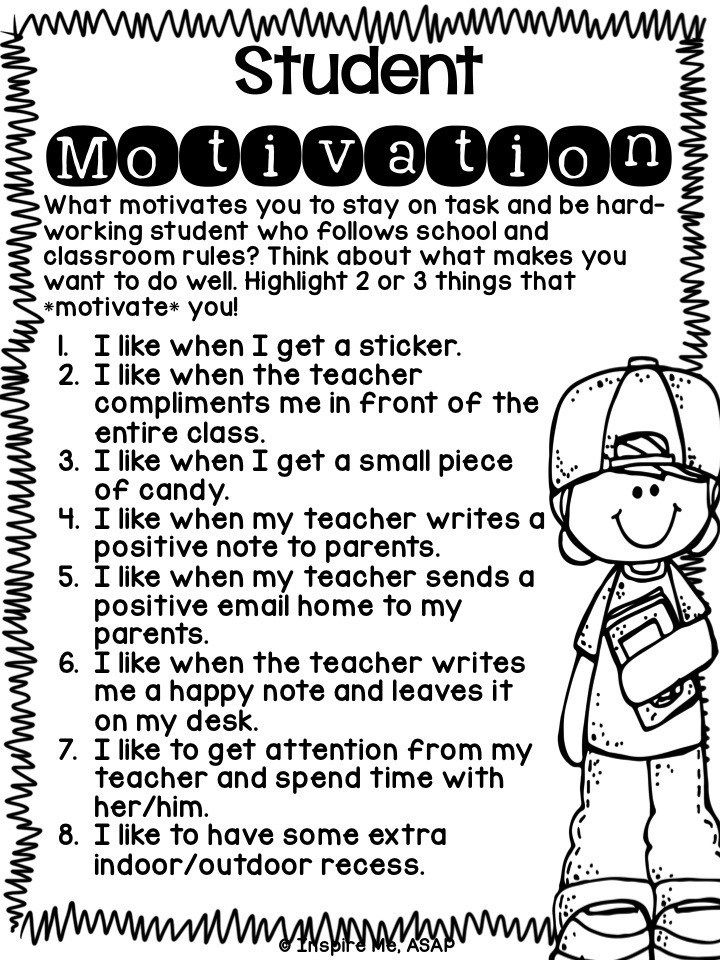
A child’s first teacher has a huge impact on a child’s future. As a parent, you should also make sure that your child’s first school experience will be perfect.
How to Motivate a Child (in a Nutshell)It really is hard to motivate a child who doesn’t care, but it is not impossible. With a little bit of effort on your part, along with collaboration with a school that values your child as much as you do, nothing is impossible.
What is important is for parents to realize that when a child is behaving a certain way, there is absolutely one big reason behind it. Observing the actions of your son can give you ideas on what you can do to solve the problem.
Another important point is to lessen your expectations of them. Do not add any more to the stress and anxiety that they are going through. Let them focus on their future.
Also, make them feel that they always have a family that they can turn to. Give them the love and the care that they need. They need to feel that they are free to be themselves.
They need to feel that they are free to be themselves.
It is true that you should be a role model for your child, but always keep in mind that they should also learn to follow their own path and that they must do it in their own way. Even if you can’t force your child to behave as you would like him to, you can always teach him to be responsible and aware of his choices.
More from Brightside Ohio
- Are Exersaucers Bad for Babies?
- What is Uninvolved Parenting and How Does It Affect Your Child
- Hostile and Instrumental Aggression: Causes and Prevention
How to Motivate an Underachieving Child
Is your child’s answer to everything, “I don’t care” or “It doesn’t matter?”
Parents often think that if they can find a new way to encourage their child, he or she will magically start achieving more.
I don’t think it’s like that at all. I think the problem is that these kids are motivated to resist, to withdraw, and to underperform. They act out by acting in.
They act out by acting in.
The first thing to understand about teens and pre-teens who seem to have no motivation is this: it’s impossible to have no motivation. Everybody is motivated in some way.
And these kids are motivated to resist and to do nothing.
Understand that to do nothing is an action. It’s an action to resist—to resist their parents and to resist their teachers. They’re motivated to say, “I don’t care,” with their words and their actions.
Once you realize that your adolescent is motivated to do nothing, it will become obvious to you that she puts a lot of energy into doing that “nothing.” She puts a lot of energy into resisting you and withdrawing from you.
When you talk with adolescents who are underachievers, you hear them express ideas that are what I call thinking errors. They say:
“It’s too hard.”
“I can’t.”
“It doesn’t matter.”
And most of all, they say:
“I don’t care.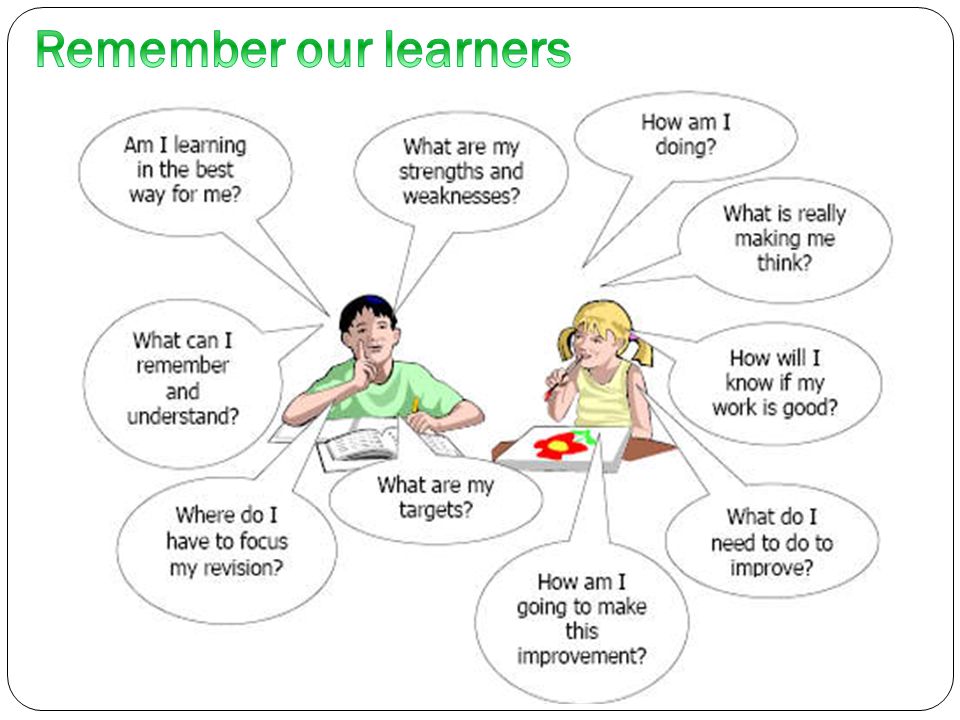 ”
”
In fact, “I don’t care” is their magic wand and their shield. “I don’t care” takes the pressure off them and makes them feel in control. When they start to feel anxious, it soothes them to say, “I don’t care.”
Fear of failure? “I don’t care.”
It’s hard to do? “I don’t care.”
It’s how they try to solve the basic problems of everyday life.
The first step in addressing this problem is to understand that you can’t make your child care. Let’s be honest, the old saying, “You can bring a horse to water, but you can’t make him drink” is true.
But you can make him thirsty. And that’s the key to managing the child who says “I don’t care.”
Here are 9 steps to take when your underachieving child says “I don’t care.”
1. Identify What You Can Use for Rewards and Incentives
Look for things that can be used as rewards for your child. Make a point of observing what your child cares about and enjoys. And don’t take his word for it because he’ll tell you he doesn’t care about anything. He’ll say that “nothing matters.”
He’ll say that “nothing matters.”
But look at his actions. If he watches TV, plays on the computer, plays video games, or texts with his friends, you know what he likes already.
Does he like going to the movies? Does he like going fishing? Take an inventory of the things he enjoys and write it all down on a piece of paper.
While I usually recommend that parents sit down with their kids and draw up this list together, in the case of kids who tend to withhold, I don’t think it’s a good idea. Don’t ask a child who uses passive-aggressive behavior because he won’t tell you. Remember, withholding is his way of maintaining control.
Once you have an inventory of what he likes, you can use these things as incentives and rewards.
Note to parents: a child who won’t attend to his work or do his chores is different from someone who’s depressed. If your child won’t come out of his room, doesn’t seem to care no matter what you take away, and is often isolated and withdrawn, you have to take that seriously and seek professional help.
2. Take the Electronics Out of His Room
I think underachieving kids should not have electronics in their rooms. Look at it this way: their room is just a place for them to withdraw.
If you have a child who holes up in his bedroom, the computer should be in the living area. And if he’s going to use it, he should be out there with other people.
He also shouldn’t have a TV or video games in his room. And if he’s not performing, don’t let him have his cell phone, either.
3. Make Your Child Earn Privileges
I think that you have to hold unmotivated kids accountable. Make sure everything is earned. Life for these kids should be uncomfortable if they do not meet their daily responsibilities.
Make them earn video games every day. And how do they earn them? By doing their homework and chores. In the same way, make them earn their cell phone today and then start over tomorrow.
This is how real life works. If you don’t work, you don’t get paid, and you don’t get the things you want.
4. Talk about What Your Child Wants
When times are good, I think you should talk to your child about what he would like to have someday. Try to sneak in different ideas to get your child to think about how he will achieve what he wants in life.
Sit down with your child and say:
“So what kind of car would you like to have? Do you like Jeeps?”
Try to get him to talk about what he’d like. Because later on you can say:
“Look, I care about you and I want you to get that Jeep—and you’re not going to get it unless you do your homework.”
As a parent, I’d be talking this way to your child from pre-adolescence onward. You can say things like:
“Just think, someday you’re going to have your own place. What kind of place would you like?”
That’s the type of thing you use to motivate adolescents because that’s what is real to them. They want to have an apartment. They want to have a girlfriend or boyfriend. And they want to have a car.
And they want to have a car.
So have conversations about what it takes to attain those things.
And don’t forget, it’s a mistake to give your teen or pre-teen lectures when you want them to do something. Instead, make them see that completing their responsibilities is in their best interests because it leads to the life they’d like to have in the future.
5. Don’t Shout or Argue
If you’re shouting, you’re just showing your frustration—and letting your child know that he’s in control.
Here’s the truth: when people start shouting, it means they’ve run out of solutions. With underperforming kids, I think you have to be very cool. Arguing, pleading, and trying to get your teen to talk about how they feel is not very effective when they’re using withholding as a relationship strategy.
In my opinion, you can try almost anything within reason for five minutes. You can negotiate, you can reason, you can ask your child about their feelings. It’s fine to say, “Is something wrong?” Just be aware that a chronic withholder will be motivated to ignore you.
6. Tell Your Child That What She Does Matters to You
Tell your child that what she does matters to you. Personalize it by saying:
“It matters to me. I care about you. I want you to do well. I can’t make you do it and I won’t force you. But it matters to me and I love you.”
By the way, when I tell parents to personalize it by saying “It matters to me,” that doesn’t mean you should take it personally. Taking something personally means believing that your child’s inappropriate behavior is directed at you. It’s not. In reality, their behavior is their overall strategy to deal with the stresses of life.
The concept of “It Matters to Me” helps because relationships can be motivating. Nevertheless, understand that your child is her own person. It’s no reflection on you if she doesn’t want to perform. You just have to set up an approach to enhance the probability that she’s going to meet her responsibilities.
But again, don’t take it personally, as if somehow you have to make her do it. The truth is, you can’t make her do anything that she doesn’t want to do. But you can hold her accountable.
The truth is, you can’t make her do anything that she doesn’t want to do. But you can hold her accountable.
7. Don’t Do Your Child’s Work
Kids learn early on that when they give up or act helpless that someone will step in and help them. Acting helpless becomes a way to get other people to do things for you. Psychologists refer to this as learned helplessness. And over time, you come to believe that you are helpless. It’s a bad lesson to learn.
When kids and teens use this shortcut, they don’t learn independence. In fact, in families where this occurs, many times you’ll find that the kids weren’t allowed to be independent. Perhaps they had to do things a certain way and all the choices were made for them. Eventually, they gave up. They surrendered.
Regardless of why your child might have developed learned helplessness, as a parent, it’s important to stop doing things that he needs to do for himself. Don’t do his homework for him. Don’t do his chores for him. Don’t do his laundry for him. Let him do those things. You can be available for help if necessary, but don’t take on his tasks.
Don’t do his laundry for him. Let him do those things. You can be available for help if necessary, but don’t take on his tasks.
I believe one of the most important things an adolescent has to learn is independence. And if you take on his responsibilities, you’re robbing him of his opportunity to learn independence.
8. Coach Your Child
Let’s face it: it’s often sports coaches who get the most out of our kids. It’s their job to help kids to want to improve their skills.
A good coach is constantly developing his players by challenging them and complimenting them on the specifics of their progress:
“Nice layup, Josh. You positioned your hands better that time. Keep it up!”
You should do the same with your kids when they meet a responsibility.
Also, a good coach doesn’t use unearned praise as a motivator. Telling someone how great they are at something when they aren’t isn’t helpful. Kids see through flattery and false praise just like adults do.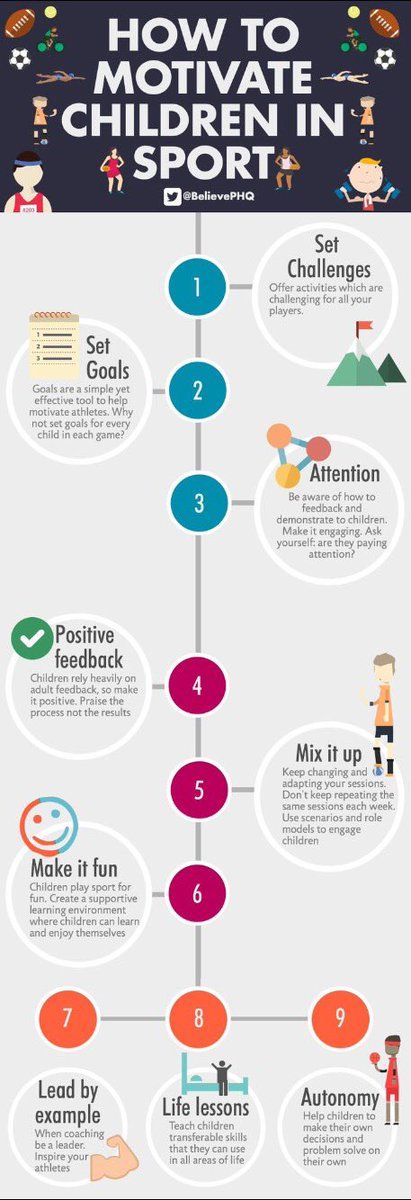 And it usually backfires.
And it usually backfires.
I think parents need to learn more about the coaching parenting style. Always keep your child looking forward. Comment on his or her progress instead of telling them how great they are when they haven’t put forth much of an effort.
9. Set Deadlines and Use Structure
Tell your child clearly when to do chores and schoolwork—and when you want them done by. I think it’s important to schedule these kids, to give them structure. Say to your child:
“Do your chores from 3 p.m. to 4 p.m., and then you’ll have free time until dinner. And during free time, you can do whatever you want to do.”
There are many possibilities. You could say:
“If you can accomplish this in X amount of time, we’ll go to your cousin’s house on Saturday.”
Remember, not everything that your child likes to do costs money, so be creative and use your list of what your child likes for ideas.
Conclusion
Being an underachiever gives your child a sense of control and power because then he doesn’t have to worry about the anxiety of failure or meeting challenging responsibilities. He doesn’t have to compete with other kids. He doesn’t have to deal with other people’s expectations.
He doesn’t have to compete with other kids. He doesn’t have to deal with other people’s expectations.
A large part of underachieving has to do with managing other people’s expectations. That’s because once you start to achieve, people expect more of you. Kids feel this quite powerfully and they don’t have much defense against it. So you’ll often see that when people start expecting more of these kids, they fall apart.
For me, it’s not about who’s to blame. It’s about who’s going to take responsibility. A kid who’s an underachiever is motivated to do less—or to do nothing—because it gives him a sense of power and it gets him out of the stress of having to meet responsibilities.
Your job as a parent is to help him by coaching him to meet those responsibilities in spite of his anxiety, fear, or apathy. And your job is to hold him accountable with consequences if he chooses not to meet those responsibilities.
Related content: How to Give Kids Consequences That Work
How to get a child to study - how to motivate a teenager to study
Content
- Lack of motivation
- Problems in teacher-student relationships
- Conflicts with classmates, ridicule, bullying
- Unfavorable family environment
- Parental super control
- Low self-esteem, self-doubt
- Excessive workload of the child after school
- Praise for successes, even the smallest ones
- Point out positive changes
- Emphasize the good qualities of the child
- Not demanding much
- share experiences
- Do not compare the child with other children
- Do not scold for bad grades
- Negotiate
- Set an example
- Consider the wishes and aspirations of the child
- Hire a tutor
- Talk about the real benefits of studying
- Instill good habits
“There is no 'don't want', there is 'must'” is a common expression used by parents whose children refuse to do something they don't want to. For example, study. This and a dozen other demotivational expressions are used when a diplomatic approach no longer helps. The good old “whip” is used, but without the carrot. And at first it may seem that the method works and brings results, because from such a strict control, the estimates really get better. But, unfortunately, this does not last long.
For example, study. This and a dozen other demotivational expressions are used when a diplomatic approach no longer helps. The good old “whip” is used, but without the carrot. And at first it may seem that the method works and brings results, because from such a strict control, the estimates really get better. But, unfortunately, this does not last long.
As a result, the child only learns to deceive and cunning, while at the same time beginning to hate everything that is connected with education. To prevent this from happening, you should rephrase the expression, replacing the word “necessary” with “want”.
The search engine returns more than two million results for the query "how to get a child to study". We talked about some of the reasons in more detail in this video:
Obviously, a huge number of parents face this problem. There are many reasons why children refuse to study. The first thing you should pay attention to is how well the child has developed mental processes: memory, attention, logic. After all, thanks to them, children better understand and remember what they read, easily focus on tasks and begin to study on their own.
There are many reasons why children refuse to study. The first thing you should pay attention to is how well the child has developed mental processes: memory, attention, logic. After all, thanks to them, children better understand and remember what they read, easily focus on tasks and begin to study on their own.
In addition, the modern education system is built in such a way as to give children the maximum amount of knowledge and, as a result, receive trained specialists. But few people think about how to properly present this knowledge. Children do not have any algorithms and technologies for self-learning, so that the child performs each action easily, meaningfully and understanding why and what result he will receive.
For example, the online course "Learn to Learn" offers methods for mastering knowledge, helps to improve the efficiency of learning, develop logic, memory and analytical skills. The course helps students understand that studying can be easy and fun, and the acquired skills will help them become responsible, self-sufficient and educated.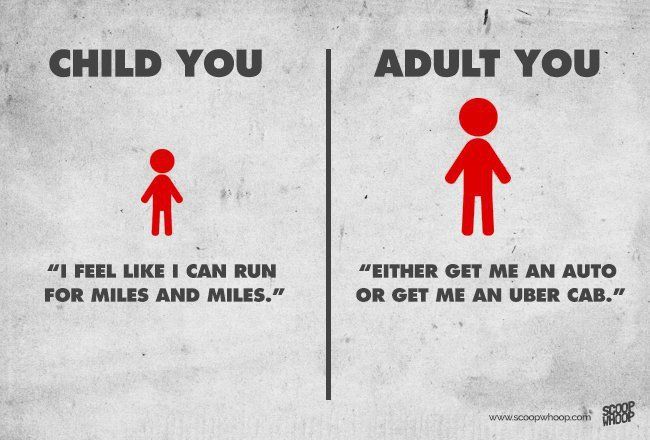
Now let's look at other, more obvious reasons for poor academic performance.
Lack of motivation
Sometimes even an adult finds it difficult to force himself to go to work in the morning, despite the fact that he understands why he needs it. Now imagine a child who does not understand why he should go to classes every day, if they don’t even get paid for it. The fact is that children, especially in the lower grades, do not understand the importance and necessity of the learning process. Because of this, it becomes boring and uninteresting for them to listen to the teacher, and even more so to spend time on homework. It is important not to force the child to study “through I don’t want to”, but to calmly explain why he needs education. Show, tell on the example of famous influencers, use school knowledge in life and be sure to praise the child for all the actions. Positive reinforcement is an important component in building motivation.
Negative motivation (fear, pain, duty, shame) traumatizes the child, hinders his intellectual activity and destroys trust in parents. There are many positive tools. For example, the reward system. Did your child do their homework for a week on their own? This is an excuse to go to your favorite ice cream parlor or order pizza.
There are many positive tools. For example, the reward system. Did your child do their homework for a week on their own? This is an excuse to go to your favorite ice cream parlor or order pizza.
At the free marathon "Motivation and Education of Children" we will tell you how to motivate your child to study at school, so that he starts learning on his own, stops suffering from homework and torturing you.
Problems in the teacher-student relationship
It may happen that the teacher does not agree with the position of the student on some issue, and this negatively affects the grades in the subject. It may be that the student himself provoked the conflict with his behavior, to which the teacher reacted with a deuce in the diary. Or the problem arose because of careless criticism of the student. Situations are different, but they can discourage the student from learning. In this case, you should talk to the child, find out what is bothering him. After that, also talk with the teacher in order to understand what is the cause of the conflict and try to eliminate it.
Conflicts with classmates, ridicule, bullying
Bullying is a constant intentional negative action directed at a child by another child or a group of children. Almost all students face bullying: someone is directly involved in it, someone becomes a victim, and someone is watching what is happening. Bullying becomes the reason that the child begins to skip, does not want to study and closes in himself. This is a very serious problem that can negatively affect the personality of the child. If you notice that your child's behavior has changed, invite him to talk. The sooner you know about the problem, the easier it will be to deal with it.
Unfavorable family environment
If the parents in the family constantly quarrel, sort things out, doing this in front of the child, it becomes difficult for him to focus on his studies. How can you think about solving a math problem when there is screaming and noise all around?
Parental oversight
Sometimes it is very important for parents to control everything that happens to relatives in the family and outside it. This also includes the school life of the child. It's not just about grades, but even designing workbooks, a diary, or preparing a birthday present for a classmate. There can be no talk of any motivation, because mom or dad will decide everything.
This also includes the school life of the child. It's not just about grades, but even designing workbooks, a diary, or preparing a birthday present for a classmate. There can be no talk of any motivation, because mom or dad will decide everything.
As a result, parents have to force their child to study. But it's absolutely not worth it. Why? We talk in this video:
You can get a comprehensive solution to the problem of educating your child at our free online lesson "How to motivate a child to learn independently."
Low self-esteem, self-doubt
It is difficult for insecure children to express themselves in school life. Asking a teacher a question, calling a classmate and finding out homework is a whole problem. If, at the same time, at home, relatives make excessive demands on the child, severely criticize for the slightest fault, call him lazy, then sooner or later he will close in himself and take the path of least resistance: he will start skipping classes, stop doing homework and will bring bad grades .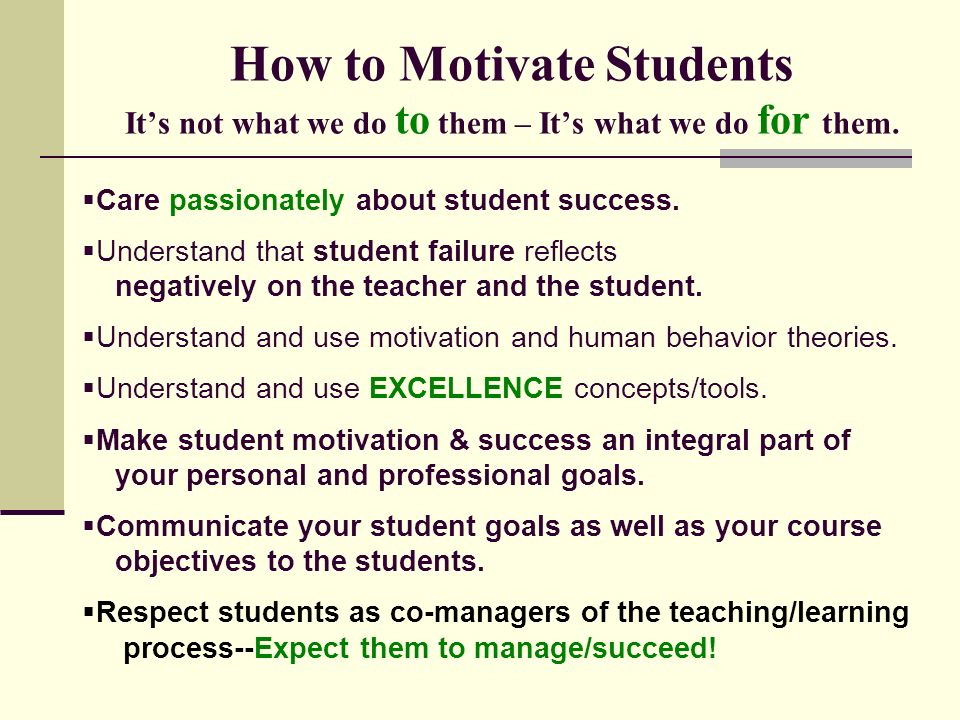 Why try if your efforts are not appreciated.
Why try if your efforts are not appreciated.
Excessive workload of the child after school
Many parents strive to organize super-saturated leisure time for their child. For example, on Monday, Wednesday and Friday - English and the pool, on Tuesdays - basketball, and on Thursday - art school. But as a result, the psyche includes protective mechanisms, protecting the brain from overwork. The student becomes lazy and starts postponing the lessons. Pursuing even the most noble goals, parents forget that a child is not a robot and he needs rest just like an adult.
13 tips for parents on how to motivate their child to study
Praise success, even the smallest
You don't have to expect 100% success from your child to praise him. It is important to notice any progress. And the age of the student does not matter. Teenagers, like elementary school students, also need support and praise.
Point out positive changes
If something is difficult for a child, still support him every time. You can say: “Wow! Look how much better you have become! If you continue in the same vein, you will do just fine!” But never say something like, "Try a little more, and then it will be fine." With such phrases you devalue small achievements.
You can say: “Wow! Look how much better you have become! If you continue in the same vein, you will do just fine!” But never say something like, "Try a little more, and then it will be fine." With such phrases you devalue small achievements.
Focus on the good qualities of the child
It is important to understand that a child's life does not revolve around school. Parents should always notice the good qualities of their child, even if these are characteristics far from learning. For example, if a child knows how to help others, has charisma, a great sense of humor, charm, or is excellent at negotiating, point out these qualities to him. Such an emphasis will help in building adequate self-esteem, which, in turn, will create self-confidence.
Not demanding much
No one is protected from overwork and burnout, not even a schoolboy. Just imagine how stressful a child is who goes to school, then goes to a few circles, and then comes home and sits down for homework. Don't expect your child to be perfect. It is normal that some subjects are more difficult for him and the student needs more time to understand them.
Don't expect your child to be perfect. It is normal that some subjects are more difficult for him and the student needs more time to understand them.
share experiences
If a child tells you that he doesn't like an object, don't scold him, but share the experience with him. For example, you can say: “Yes, I understand that you don’t like physics so much, but it needs to be studied. You can always share your thoughts with me so that we can discuss how you feel.”
Do not compare your child with other children
Comparisons always only provoke resentment and practically do not affect motivation. The successes of the “son of my mother’s friend” will not help the child to correct grades and start learning on their own, but will only cause a reluctance to study on the principle “I won’t succeed anyway”.
To help a child do what is necessary and important, one should “gather” universal motivation. In our free lessons of the course on motivating children, we will talk about the causes of demotivation and what to do about it, why it is impossible to force a child to study well, as well as how to change the child's behavior and restore trust and openness in parent-child relationships.
And in this video we talk about how children's behavior will change if you stop forcing them to learn:
Do not scold for bad grades
Motivation for progress and achievement must be positive. A bad score only shows that you need to try harder to improve the result. If you punish a student for a bad grade with all sorts of restrictions, his motivation will be negative. And it forms either fear or nihilism.
Negotiate
A contract is one of the most reliable and effective tools for working with children's motivation. It should be noted right away that the contract should be beneficial not only to you, but also to the child. You can not demand fives from a schoolboy without offering anything in return. For example, you might say, "If you do your homework for a week, we'll go to the movies this weekend.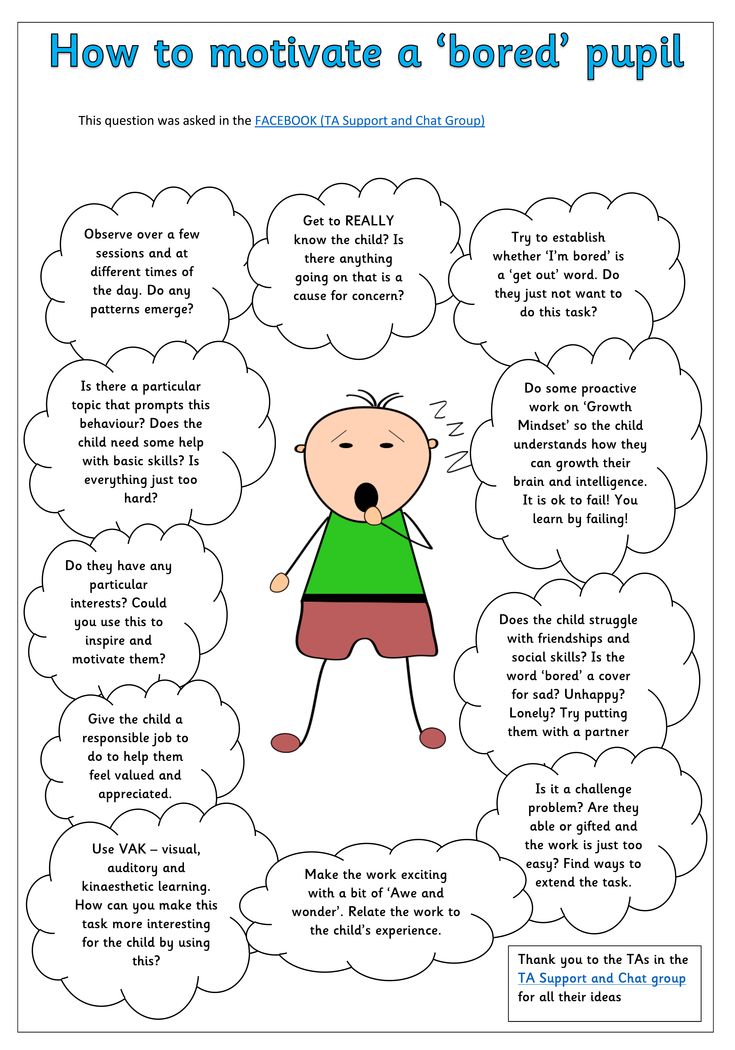 " Or: “If you write a good test, you can invite your friends and play with them on the console at the weekend.”
" Or: “If you write a good test, you can invite your friends and play with them on the console at the weekend.”
Motivation is an art. In order for a child to want to study independently, it is necessary to find the right approach. In a practical online course for parents, we will tell you how to set up parental authority and properly negotiate with your child so that he does not let you down and does not break agreements.
Set an example
It is pointless to try to teach your child to do homework while you are scrolling through TikTok or watching a series, for example. Children love to copy their parents. So if the goal is to instill in your child a love of reading, put down your smartphone and read an interesting book.
Consider the wishes and aspirations of the child
To motivate children, their interests must be taken into account. Ask your child what they like to do. If he is interested in cinema, it is worth figuring out how to connect screenwriting with a desire to learn. You can come up with interesting tasks: for example, offer to start writing a fascinating script about the school so that studies start to seem more interesting.
You can come up with interesting tasks: for example, offer to start writing a fascinating script about the school so that studies start to seem more interesting.
Hire a tutor
If one of the subjects is especially difficult for a child, then a good solution would be to hire a tutor. Read our article on how to choose the right specialist.
Talk about the real benefits of studying
Children do not understand why parents get up early every morning and go to work, why they improve their qualifications, strive to improve. That is why you should not start a conversation about the fact that fives mean a comfortable future. It is better to talk about the real benefits of studying, for example, that it will make him more free, give him the opportunity to try himself in different areas, understand what he really likes, and choose the right profession.
Inculcate good habits
Curiosity is fueled by the habit of learning something new. And this is one of the best qualities that motivates a person to develop intelligence throughout life. It is important to instill good habits like reading, but the main thing is to combine them with the interests of the child himself. For example, if he hates math, stop buying him educational books. Better start solving logic puzzles together, draw or learn English. Instill those habits that the brain will not reject.
It is important to instill good habits like reading, but the main thing is to combine them with the interests of the child himself. For example, if he hates math, stop buying him educational books. Better start solving logic puzzles together, draw or learn English. Instill those habits that the brain will not reject.
How to get a child to study? No way. But to motivate with the help of our tips and recommendations is quite real.
7 proven ways to motivate your child in elementary school
Why study? Even if the child does not ask himself this question, he plays the computer, watches 100 channels, communicates in social networks - all this is very easy and interesting, and learning is a daily work that requires tension and concentration. How to make school not hard labor, but a place where you want to come? Primary school teacher with 20 years of experience Natalya Tikhonova from the school named after. N. M. Karamzina (Moscow) shares her experience of motivating elementary school students, because it is in the first school years that attitudes towards learning are formed.
Natalya Tikhonova with her students
By focusing on individual groups, the approach can be individualized. A certain pattern can be traced in my work: already in the second grade, a group of students is usually formed who grasp the material faster, and they get bored in the lessons. In order to give them an incentive and encourage their desire to learn, I assigned them an important role in the lessons - they help those groups of children who are having difficulties. Any teacher knows that when you explain a topic to another, you yourself remember it much better. To myself, I call these guys "my helpers." These children, in a sense, try on the role of a teacher, learn responsibility and the ability to express their thoughts. Working as assistants gives them great joy. At the same time, some children learn much easier the information received from classmates. There are children who really want to get into the group of helpers and perform more difficult tasks.
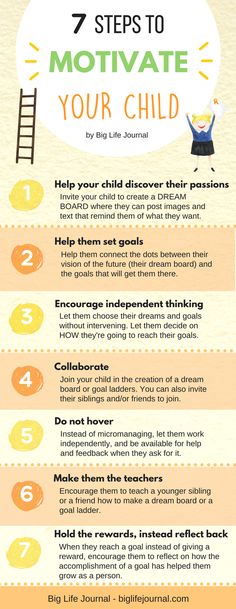 So it motivates the whole class.
So it motivates the whole class. 2. Use a computer for individual work
The computer cannot be used as a means of motivation - I never reward students with computer work, but I do not prohibit it either. A computer and online educational services are tools with which a teacher can set up individual work with each student. It is important for a child to feel interest in the subject, and this is difficult to implement in a situation where the teacher uses the same approach to all his students.
Now I use the Yandex.Tutorial service. This is a convenient collection of tasks in the Russian language and mathematics, it allows you to issue tasks to each student separately, focusing on his level, individual characteristics and even hobbies. One group of children can be given tasks on the service, another group can be asked to help them, and with the third group, a quiz or frontal lesson can be held at the blackboard. Then the students switch places.
After the lessons, you can analyze how much the material was learned.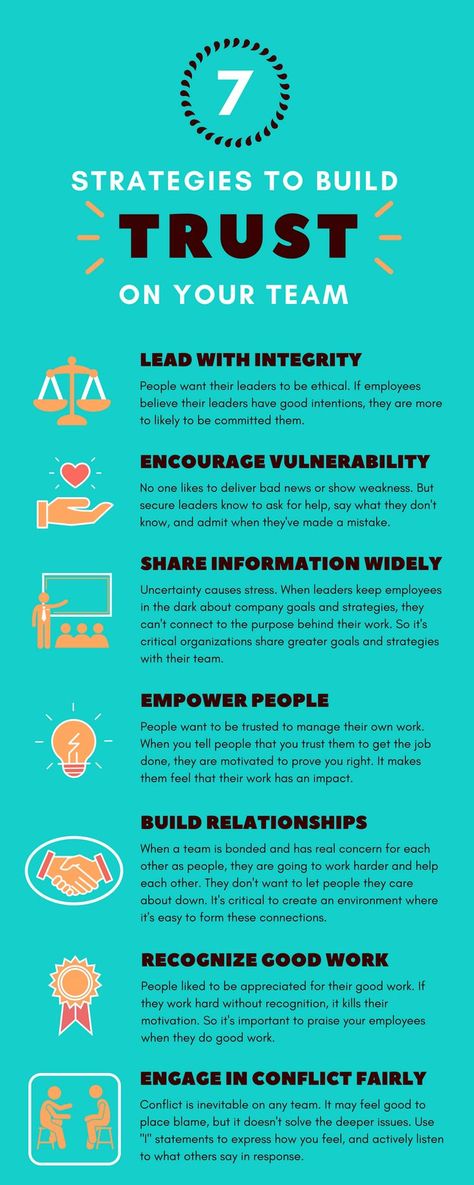 The service shows how much time the student spent on tasks and with what attempt he coped with it. There are three attempts for each task. If children do not want to do some exercise, they can skip it - I also see this and then I understand that someone has not mastered the topic.
The service shows how much time the student spent on tasks and with what attempt he coped with it. There are three attempts for each task. If children do not want to do some exercise, they can skip it - I also see this and then I understand that someone has not mastered the topic.
3. Praise for mistakes and reward for beautiful letters
We all want to be successful in what we do. If children succeed in something, they want to do it further. If not, the motivation disappears. Therefore, it is important to find the positive aspects in everything and point to them. For example, if a loser used to make 20 mistakes and suddenly made 15, it’s still a deuce, but for a particular child this is a huge progress, and he should be praised. One of my students solved the problem incorrectly. To the question "Why?" he replied that he was trying to find a non-standard approach to the solution. I gave him a 5 for this attempt, despite the fact that the answer was wrong, and asked him to solve the same problem in the standard way.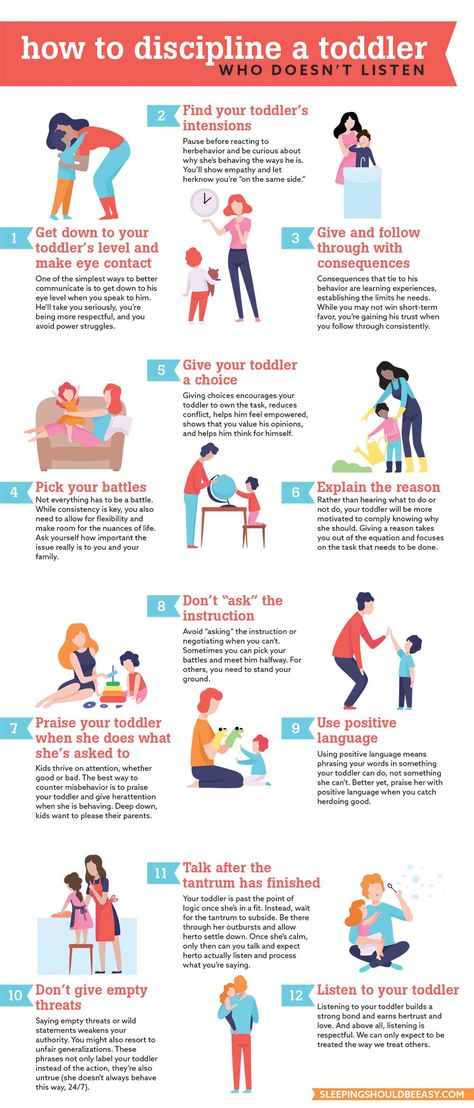 He did it, and I gave him a second 5. It is necessary to encourage not only the results, but also the efforts of children, then they will want to try further.
He did it, and I gave him a second 5. It is necessary to encourage not only the results, but also the efforts of children, then they will want to try further.
If in the Russian language task the text as a whole is written “like a chicken paw” and the spelling leaves much to be desired, you should find at least one beautiful letter, mark it and praise the child for such a beautiful spelling. This will prove to him that he has achieved success, even if so far only in a single letter.
5. Create a "Tree of Knowledge" and a portfolio of achievements
It is important for a child not only to receive external recognition from parents, teachers, classmates, but also to feel proud of their own success in front of themselves. To do this, you can keep a portfolio of work and achievements from the first grade. This allows the child to see what he has achieved and strive for the best. Even if there is nothing perfect to add to the portfolio yet, there should be plans for the future that the children themselves will choose. In our class, there is a law that a portfolio should never be empty, so the goals in it constantly turn into achievements.
In our class, there is a law that a portfolio should never be empty, so the goals in it constantly turn into achievements.
A tree is pasted on the wall of our classroom, on which children, depending on the situation, attach different pieces of paper, for example, the rules of the Russian language, or small self-portraits. We call it the "Knowledge Tree". In order for the disciples to feel external recognition, fruits of pride periodically appear on the tree. At the end of the trimester, I place apples on the tree with the names of children who completed the training stage with "good" and "excellent". After participating in competitions, conferences, championships, diplomas and certificates “grow” on a tree.
6. Apply knowledge here and now
“If you study poorly, you will become a janitor!”, “Study and you will take a worthy place in society”, “You need to study well to be someone in this life” - these messages never won't work for a child. He lives for today. He needs to be given a clear idea of how this or that knowledge will be useful in his life here and now. For example, the multiplication table makes life easier and saves time: instead of writing 2+2+2+2+2+2, you can write it short and count quickly 2×6.
He needs to be given a clear idea of how this or that knowledge will be useful in his life here and now. For example, the multiplication table makes life easier and saves time: instead of writing 2+2+2+2+2+2, you can write it short and count quickly 2×6.
While learning about writing in first grade, children can write a letter, go to the post office, and mail it to their home address. The letter arrives in the mailbox and the child sees the real result of his actions. The child must be placed in the role of an active figure - not just retelling a fairy tale, but putting on a theatrical performance, not just reading aloud, but guessing what will happen next and finding out the correct answers.
7. And no silence in the classroom!
Children need impressions, emotions and actions. In a modern elementary school, silence in the classroom is a sign that something is going wrong. The class must be seething, there must be constant activity. Instead of answers at the blackboard, when one student answers and the whole class listens, we shift desks and work on projects in groups, and then each group defends its own project.












